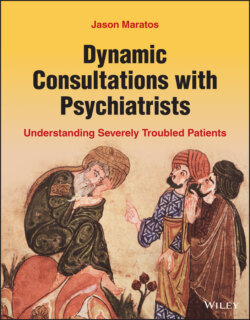Читать книгу Dynamic Consultations with Psychiatrists - Jason Maratos - Страница 41
Past Psychiatric History
ОглавлениеMrs. A was first known to the mental health service in 2006. She was seen twice in the clinic at that time for generalized anxiety disorder with insomnia, but she defaulted at follow up. That episode was triggered by an event of a gas explosion in the flat below her apartment. This event was widely publicized in the city. The explosion occurred in the context of domestic conflict. There were three deaths in the incident including two residents of the flat and an old lady of a neighboring flat. The person who set the gas explosion was an elderly man who was the owner of that flat and who was later jailed. In the afternoon of that day, Mrs. A was suddenly woken up by a loud noise and some smoke. She saw her own windows and glass drawers broken. She evacuated downstairs immediately. When she arrived at the balcony, she looked up to see the fire scene and was overwhelmed with fears. It was arranged for her to stay in the community center for one night and then in a temporary housing unit for 3 months. Afterward, she suffered from a startling response and apprehension whenever she heard a loud noise or passing the floor of the incident when she returned to live at home. These symptoms lasted for about a year and then gradually subsided. She was referred by a social worker to receive a psychological intervention at that time. She recalled that the clinical psychologist taught her some relaxation techniques involving muscle relaxation and listening to relaxing music. She did not practice the techniques often and the psychologist service was terminated after 1 year when her symptoms subsided.
A few years later in 2011, Mrs. A presented to the psychiatric clinic again. This time she was troubled by menopausal symptoms. She developed low mood, poor sleep, and appetite, was feeling anxious, experienced chest tightness, dizziness, and had poor motivation. She attributed these complaints to depression because she felt her symptoms were similar to the description of depression she read in newspaper articles. She was started on fluoxetine and had regular follow up in the clinic. She achieved remission shortly after the start of antidepressants.
Two years later, in 2013, Mrs. A suffered a relapse of depression. This time it was triggered by her daughter having a road traffic accident abroad. It was a minor accident; her daughter was only mildly injured and made a good recovery. She was worried and then developed persistent low mood, poor sleep, loss of appetite, chest tightness, and dizziness. She had lack of motivation, and she did not want to see anyone at that time. She stopped her usual habit of daily exercise with her neighbors. She was added on Deanxit in the clinic. She achieved remission again shortly after adjustment of the medication.
In the next 2 to 3 years, her husband suffered from multiple physical problems, including cancer of the lung and prostate, with brain metastases, complicated by epilepsy. Her husband was physically frail in the last few years of life, and she had to take care of him. Her husband eventually died in December 2015. She had a normal grief reaction. She missed her husband, but she soon accepted the loss. She felt that his death was a good way to end her husband's long‐term suffering from the illness.
Mrs. A then had a stable mental state until the current episode of depressive mood, which was triggered by younger son's change in work duty and her gathering with old classmates. She advanced her clinic appointment this time, and her antidepressant dosage was adjusted. She soon achieved remission again after around 1 month.
